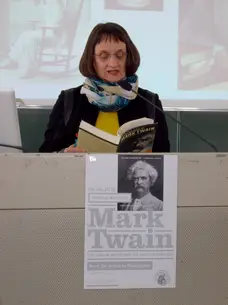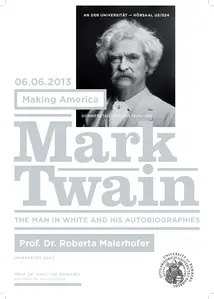Prof. Dr. Roberta Maierhofer (Universität Graz): "Mark Twain: The Man in White and His Autobiographies"
Thursday, 06.06.2013, 14:15–15:45 Uhr, U5/00.24
Samuel Langhorne Clemens (1835-1910), better known as Mark Twain, is an internationally acclaimed and widely read author. In celebration of the hundredth anniversary of his death in 2010, the first volume of his entire, uncensored autobiography was published. (Little is it known that parts of this autobiography had already been published according to an exact plan that Mark Twain had drafted before his death.) The complete autobiography of 2010 quickly became a New York Times bestseller and was translated into German in 2012. Twain's intention was to 'speak from the grave' and ensure that his reputation as a great author would be fueled years after his death.
In this talk, the concoction of Twain’s humor, ideas, opinions and anecdotes will be presented through excerpts from his autobiography. Questions of life story writing and image building will frame the reading from the text. Twain's claim to "talk only about the thing which interests you for the moment" means that we as readers are challenged to make connections and to establish structure in order to confront Twain’s "whole frank mind."
Roberta Maierhoferis Professor of American Studies at the University of Graz, Austria, and Adjunct Professor at Binghamton University, New York. Her research focuses on American Literature and Cultural Studies, Feminist Literature and Research, Transatlantic Cooperation in Education and Age/Aging Studies. Roberta Maierhofer holds a master's and a doctoral degree from the University of Graz as well as an M.A. degree in comparative literature from SUNY Binghamton. She served as Vice Rector for International Relations of the University of Graz from 1999-2011. Since 2007, she has been directing the Center for Inter-American Studies of the University of Graz. In her publication, Salty Old Women: Gender and Aging in American Culture, she developed a theoretical approach to gender and aging (anocriticism), and she has published widely in the field of cultural gerontology.


2
